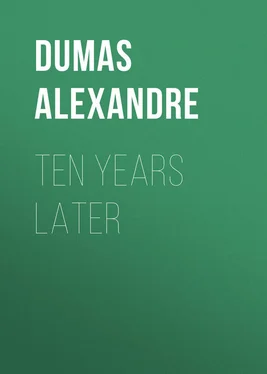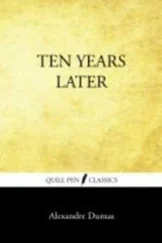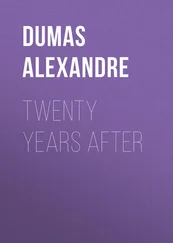Alexandre Dumas - Ten Years Later
Здесь есть возможность читать онлайн «Alexandre Dumas - Ten Years Later» — ознакомительный отрывок электронной книги совершенно бесплатно, а после прочтения отрывка купить полную версию. В некоторых случаях можно слушать аудио, скачать через торрент в формате fb2 и присутствует краткое содержание. Жанр: literature_19, foreign_antique, foreign_prose, на английском языке. Описание произведения, (предисловие) а так же отзывы посетителей доступны на портале библиотеки ЛибКат.
- Название:Ten Years Later
- Автор:
- Жанр:
- Год:неизвестен
- ISBN:нет данных
- Рейтинг книги:4 / 5. Голосов: 1
-
Избранное:Добавить в избранное
- Отзывы:
-
Ваша оценка:
- 80
- 1
- 2
- 3
- 4
- 5
Ten Years Later: краткое содержание, описание и аннотация
Предлагаем к чтению аннотацию, описание, краткое содержание или предисловие (зависит от того, что написал сам автор книги «Ten Years Later»). Если вы не нашли необходимую информацию о книге — напишите в комментариях, мы постараемся отыскать её.
Ten Years Later — читать онлайн ознакомительный отрывок
Ниже представлен текст книги, разбитый по страницам. Система сохранения места последней прочитанной страницы, позволяет с удобством читать онлайн бесплатно книгу «Ten Years Later», без необходимости каждый раз заново искать на чём Вы остановились. Поставьте закладку, и сможете в любой момент перейти на страницу, на которой закончили чтение.
Интервал:
Закладка:
“Married?”
“Yes, here is my hand, Louise; will you place yours within it?”
“But your father?”
“My father leaves me perfectly free.”
“Yet – ”
“I understand your scruples, Louise; I will consult my father.”
“Reflect, M. Raoul; wait.”
“Wait! it is impossible. Reflect, Louise, when you are concerned! it would be insulting, – give me your hand, dear Louise; I am my own master. My father will consent, I know; give me your hand, do not keep me waiting thus. One word in answer, one word only; if not, I shall begin to think that, in order to change you forever, nothing more was needed than a single step in the palace, a single breath of favor, a smile from the queen, a look from the king.”
Raoul had no sooner pronounced this latter word, than La Valliere became as pale as death, no doubt from fear at seeing the young man excite himself. With a movement as rapid as thought, she placed both her hands in those of Raoul, and then fled, without adding a syllable; disappearing without casting a look behind her. Raoul felt his whole frame tremble at the contact of her hand; he received the compact as a solemn bargain wrung by affection from her child-like timidity.
Chapter XV. The Consent of Athos
Raoul quitted the Palais Royal full of ideas that admitted no delay in execution. He mounted his horse in the courtyard, and followed the road to Blois, while the marriage festivities of Monsieur and the princess of England were being celebrated with exceeding animation by the courtiers, but to the despair of De Guiche and Buckingham. Raoul lost no time on the road, and in sixteen hours he arrived at Blois. As he traveled along, he marshaled his arguments in the most becoming manner. Fever is an argument that cannot be answered, and Raoul had an attack. Athos was in his study, making additions to his memoirs, when Raoul entered, accompanied by Grimaud. Keen-sighted and penetrating, a mere glance at his son told him that something extraordinary had befallen him.
“You seem to come on a matter of importance,” said he to Raoul, after he had embraced him, pointing to a seat.
“Yes, monsieur,” replied the young man; “and I entreat you to give me the same kind attention that has never yet failed me.”
“Speak, Raoul.”
“I present the case to you, monsieur, free from all preface, for that would be unworthy of you. Mademoiselle de la Valliere is in Paris as one of Madame’s maids of honor. I have pondered deeply on the matter; I love Mademoiselle de la Valliere above everything; and it is not proper to leave her in a position where her reputation, her virtue even, may be assailed. It is my wish, therefore, to marry her, monsieur, and I have come to solicit your consent to my marriage.”
While this communication was being made to him, Athos maintained the profoundest silence and reserve. Raoul, who had begun his address with an assumption of self-possession, finished it by allowing a manifest emotion to escape him at every word. Athos fixed upon Bragelonne a searching look, overshadowed indeed by a slight sadness.
“You have reflected well upon it?” he inquired.
“Yes, monsieur.”
“I believe you are already acquainted with my views respecting this alliance?”
“Yes, monsieur,” replied Raoul, in a low tone of voice; “but you added, that if I persisted – ”
“You do persist, then?”
Raoul stammered out an almost unintelligible assent.
“Your passion,” continued Athos, tranquilly, “must indeed be very great, since, notwithstanding my dislike to this union, you persist in wanting it.”
Raoul passed his hand trembling across his forehead to remove the perspiration that collected there. Athos looked at him, and his heart was touched by pity. He rose and said, —
“It is no matter. My own personal feelings are not to be taken into consideration since yours are concerned; I am ready to give it. Tell me what you want.”
“Your kind indulgence, first of all, monsieur,” said Raoul, taking hold of his hand.
“You have mistaken my feelings, Raoul, I have more than mere indulgence for you in my heart.”
Raoul kissed as devotedly as a lover could have done the hand he held in his own.
“Come, come,” said Athos, “I am quite ready; what do you wish me to sign?”
“Nothing whatever, monsieur, only it would be very kind if you would take the trouble to write to the king, to whom I belong, and solicit his majesty’s permission for me to marry Mademoiselle de la Valliere.”
“Well thought, Raoul! After, or rather before myself, you have a master to consult, that master being the king; it is loyal in you to submit yourself voluntarily to this double proof; I will grant your request without delay, Raoul.”
The count approached the window, and leaning out, called to Grimaud, who showed his head from an arbor covered with jasmine, which he was occupied in trimming.
“My horses, Grimaud,” continued the count.
“Why this order, monsieur?” inquired Raoul.
“We shall set off in a few hours.”
“Whither?”
“For Paris.”
“Paris, monsieur?”
“Is not the king at Paris?”
“Certainly.”
“Well, ought we not to go there?”
“Yes, monsieur,” said Raoul, almost alarmed by this kind condescension. “I do not ask you to put yourself to such inconvenience, and a letter merely – ”
“You mistake my position, Raoul; it is not respectful that a simple gentleman, such as I am, should write to his sovereign. I wish to speak, I ought to speak, to the king, and I will do so. We will go together, Raoul.”
“You overpower me with your kindness, monsieur.”
“How do you think his majesty is affected?”
“Towards me, monsieur?”
“Yes.”
“Excellently well disposed.”
“You know that to be so?” continued the count.
“The king has himself told me so.”
“On what occasion?”
“Upon the recommendation of M. d’Artagnan, I believe, and on account of an affair in the Place de Greve, when I had the honor to draw my sword in the king’s service. I have reason to believe that, vanity apart, I stand well with his majesty.”
“So much the better.”
“But I entreat you, monsieur,” pursued Raoul, “not to maintain towards me your present grave and serious manner. Do not make me bitterly regret having listened to a feeling stronger than anything else.”
“That is the second time you have said so, Raoul; it was quite unnecessary; you require my formal consent, and you have it. We need talk no more on the subject, therefore. Come and see my new plantations, Raoul.”
The young man knew very well, that, after the expression of his father’s wish, no opportunity of discussion was left him. He bowed his head, and followed his father into the garden. Athos slowly pointed out to him the grafts, the cuttings, and the avenues he was planting. This perfect repose of manner disconcerted Raoul extremely; the affection with which his own heart was filled seemed so great that the whole world could hardly contain it. How, then, could his father’s heart remain void, and closed to its influence? Bragelonne, therefore, collecting all his courage, suddenly exclaimed, —
“It is impossible, monsieur, you can have any reason to reject Mademoiselle de la Valliere! In Heaven’s name, she is so good, so gentle and pure, that your mind, so perfect in its penetration, ought to appreciate her accordingly. Does any secret repugnance, or any hereditary dislike, exist between you and her family?”
“Look, Raoul, at that beautiful lily of the valley,” said Athos; “observe how the shade and the damp situation suit it, particularly the shadow which that sycamore-tree casts over it, so that the warmth, and not the blazing heat of the sun, filters through its leaves.”
Читать дальшеИнтервал:
Закладка:
Похожие книги на «Ten Years Later»
Представляем Вашему вниманию похожие книги на «Ten Years Later» списком для выбора. Мы отобрали схожую по названию и смыслу литературу в надежде предоставить читателям больше вариантов отыскать новые, интересные, ещё непрочитанные произведения.
Обсуждение, отзывы о книге «Ten Years Later» и просто собственные мнения читателей. Оставьте ваши комментарии, напишите, что Вы думаете о произведении, его смысле или главных героях. Укажите что конкретно понравилось, а что нет, и почему Вы так считаете.












